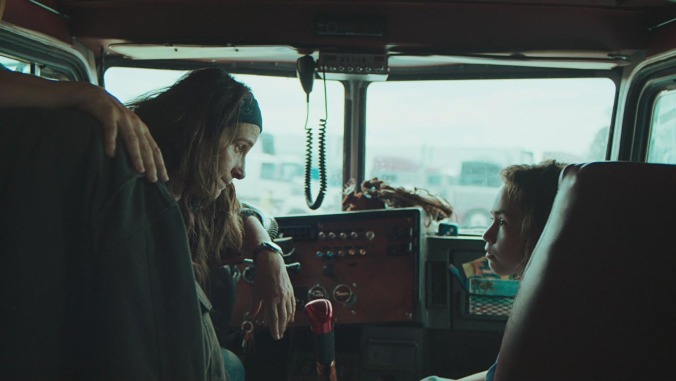Paradise Highway isn't a road worth taking
Even with the pairing of Juliette Binoche and Frank Grillo, the film doesn't produce dynamic results

What’s the reverse of Chekhov’s Gun, where a firearm we’ve never seen before suddenly goes off in order to bring drama to a scene, requiring lots of explanation after the fact about how it got there in the first place? Because Paradise Highway does that. Not just literally, with a gun, but also later with crucial character details that would have made the climax far more cathartic if that information had been introduced earlier into the story in any significant way.
Juliette Binoche and Frank Grillo seem like actors whose work you’d only connect in a game of Six Degrees, but Lionsgate has cut out the middlemen (or women). Here they play troubled siblings, and the movie devotes a lot of dialogue upfront to explain their different accents. Dennis (Grillo), who is about to be released from prison, spends most of his screen time strictly as a voice on the other end of the phone. Binoche’s Sally is a take-no-shit trucker who swears a blue streak.
While she’s the more virtuous of the two, Sally isn’t that good. In order to keep her criminal brother alive behind bars, she has undertaken a few illegal transports, and ahead of Dennis’ release, he springs one more on her. Anyone who’s seen The Transporter movies—or even The Mandalorian—may guess what comes next. The cargo this time is alive: a pre-teen girl. While Sally does her best to keep her charge at arm’s length, the delivery doesn’t go smoothly, leaving her and the young Leila (Hala Finley) running from both cops and sex traffickers.
Binoche, perhaps it can go without saying, is no Jason Statham. That’s usually a good thing, but anyone expecting an action thriller will quickly discover that Binoche does about as many big action sequences as you’d expect her to do—which is none. But she will absolutely make you believe she’s a worn-out trucker, because at any budget, utter authenticity is the quality she brings to her roles.
Meanwhile, FBI Agent Sterling (Cameron Monaghan) and retired consultant Gerick (Morgan Freeman) remain a step or two behind her, trying to figure out what’s going on while the audience already knows. It’s mostly an excuse for them to banter, with Freeman acting annoyed to even be on set and Monaghan gamely trying to extract a good scene out of him. Many journalists who have interviewed Freeman at press junkets will relate, and find (possibly unintentional) humor in his obvious irritation.
Norwegian writer-director Anna Gutto apparently won the 2016 Zaki Gordon Award for Excellence in Screenwriting for this screenplay, which feels surprising if what’s on the page was anything like what ends up in the final movie. A relatively simple A-to-B story, Paradise Highway is neither brutal enough to play as an exploitation thriller, nor enough of a world-building deep dive into trucking and trafficking to measure up against similar and superior dramas like What Alice Found and Honey Bee. The film tries for one nasty gross-out moment early on, but otherwise feels compromised on all sides. Suffice it to say, it’s still a movie safe enough for General Mills to allow large pallets of its cereal to appear in a key scene.
Young Finley eschews cuteness as much as possible, playing Leila almost as feral at the beginning—a writhing mass of gutteral screams and uncontrolled bodily functions, designed to be as distasteful as possible to would-be kidnappers. World-weary Binoche plays Sally as someone who’s too old for such nonsense, at least in theory. But as time goes on, and their dependence on one another’s safety becomes more concrete, she turns out not to be too old and hardened after all. But neither actress consciously attempts to be likable, which is precisely why they manage to be so by the end.
If only their adventure together were more interesting. Child-trafficking is obviously a terrifying threat to hover like a cloud over any story, but the actual onscreen villains who are the face of it here feel disposable and barely competent. Partly wasted in his sidekick role, Monaghan, who remains responsible for the most comics-faithful version ever of the Joker in live-action (via Fox’s Gotham), might have been put to better use as a scary megavillain. Instead, he showcases his range as a generous scene partner.
“Fun” may be the wrong adjective to apply to any story like this. But if Paradise Highway is not going to indulge in a sense of excitement or escapism, it needs to do something else—enlighten, thrill, or deliver catharsis, perhaps. But with a lot of unpredictability and not enough set-up, the climax doesn’t offer as much emotional release as it could. Moreover, Grillo mostly being an offscreen voice doesn’t help much. As intriguing as the combination of Binoche and Grillo might sound, it would be much more impactful if they shared the screen for more than a handful of scenes. As such, the movie begins with a bang, but it ends with a whimper.